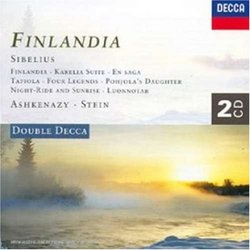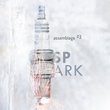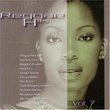| All Artists: Jean Sibelius, Horst Stein, Vladimir Ashkenazy, L'Orchestre de la Suisse Romande, Philharmonia Orchestra of London, Elisabeth Söderström Title: Sibelius: 'Finlandia' (suites & symphonic poems) Members Wishing: 0 Total Copies: 0 Label: Decca Release Date: 8/26/1997 Album Type: Original recording reissued Genre: Classical Styles: Forms & Genres, Theatrical, Incidental & Program Music Number of Discs: 2 SwapaCD Credits: 2 UPC: 028945257624 |
Search - Jean Sibelius, Horst Stein, Vladimir Ashkenazy :: Sibelius: 'Finlandia' (suites & symphonic poems)
 | Jean Sibelius, Horst Stein, Vladimir Ashkenazy Sibelius: 'Finlandia' (suites & symphonic poems) Genre: Classical
|
Larger Image |
CD DetailsSimilar CDs
|
CD ReviewsGreat Music, Sturdy Performances Karl Henning | Boston, MA | 01/09/2002 (5 out of 5 stars) "With some composers, it seems that when it is a matter of writing symphonies, the music is a little graver, a little rhetorical, perhaps even a little long-winded and heavy-footed; but when such a composer turns to symphonic poems, or dances/ballet, the music is more imaginative, lighter in spirit and surer of foot, or even in some cases, just plain more inspired.While Sibelius managed to write brilliant and engaging music in both "spheres," there are times when I feel [parts of] the symphonies are a little ruminative, a shade too self-absorbed ... and it is then that I find the tone-poems - in which he often, simply, sang, and sang for the sheer joy of singing - especially welcome.This recording is one of those re-issues, which were originally two separate releases; so we have two different conductors, and two different orchestras, to discuss.In general, I am not mad about Ashkenazy as a conductor; and in a sense, this recording is no exception ... I don't walk away thinking, "Wow, what a great conductor." But he is certainly a competent musician, and he does a creditable job here; the Philharmonia sounds fine for the most part. The brass are a little edgier in "Finlandia" than I quite like; and towards the end, the timpani are a little too wild. But on the whole, neither "Finlandia" nor the Karelia Suite is done any great hurt on the Ashkenazy half of this set.The bright gem on this disc is "Luonnotar," a restless folk-ballad for soprano and orchestra. Elisabeth Söderström is splendid here. "Tapiola" and "En Saga" come across well, too.Not a disc that you walk away saying, "Wow, what a great conductor"; but, "Wow, what great music."The other disc is Horst Stein leading L'Orchestre de la Suisse Romande. Any composer might design to follow Sibelius' example here: the program is "Night-Ride and Sunrise," "Pohjola's Daughter," and the four "Legends from the Kalevala" (including the well-loved, and often separately-peformed, "Swan of Tuonela"). Seventy-one minutes of music, and not a dull moment from start to finish." Very good recordings Sungu Okan | Istanbul, Istanbul Turkey | 09/21/2003 (5 out of 5 stars) "This box set contains, all famous symphonic poems of Sibelius...i think, especially, The Night-Ride and Sunrise and Leminkainen in Tuonela (No. 3 of suite) is best tracks in CD 2, perhaps these are among in Horst Stein's all recordings...L'Orchestre de la Suisse Romande (the orchestra of E. Ansermet) is very good...In CD 1, all works recorded by Ashkenazy and his PO. Already, his all Sibelius recording are very good, and especially the performances of Finlandia and Karelia are best.And Elisabeth Sodeström is very good on Luonottar. This is a lied-symphonic poem and not too known, but very interesting music. And based on famous Kalevala epic...However, the tempos of "En saga" is very slow (aproxx. 20 min.) But not bad. This symphonic poem is Sibelius' first succesful work and hasn't a programme.In other words: this box set (at this price) very good and highly recommended for all Sibelius fans." Great Sibelius from Ashkenazy with Philharmonia Daniel M. Forman | San Francisco, CA United States | 05/04/2005 (5 out of 5 stars) "Before I launch into my review, I would like to make it clear that I do not actually have this album. I do, however, have two other albums of Ashkenazy/Philharmonia that are not listed on Amazon, which include the works Symphony No. 4, Luonuotar, Finlandia (twice), Karelia Suite, Tapiola, and En Saga.
Ashkenazy conducts Sibelius better than anyone else I have heard. Under his baton, the music is more exciting, more colorful, and far more alive than I have heard it elsewhere. His interpretation of Finlandia is the only one that I will listen to; nothing else even compares. These are recordings that I would trust to the ends of the earth. Ashkenazy's instrument for the recordings I refer to is the incredible Philharmonia Orchestra of London. They are well up to the task, technically, musically, and sonically. Every section is filled with color. The strings are beautiful and lush (with VERY powerful bassi), winds have a very dark sound with much more presence than I often hear elsewhere, and brass are more alive, have more blend, and are more together than virtually anyone else I have heard - certainly more so than anyone else I've heard play Sibelius. I highly recommend all recordings of Sibelius by Ashkenazy with the Philharmonia Orchestra, without reservation." |

 Track Listings (7) - Disc #1
Track Listings (7) - Disc #1


